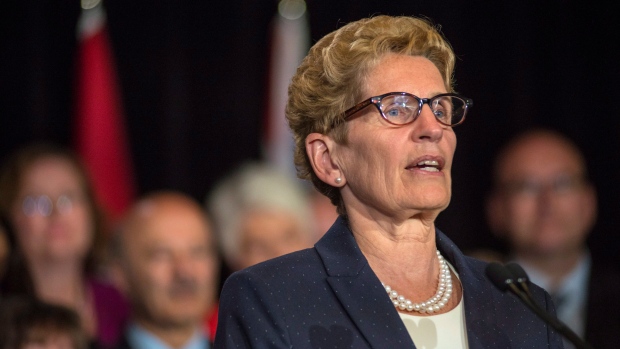Jun 21, 2016
Wynne takes credit for CPP deal: 'Ontario's determination paid off'
, The Canadian Press

TORONTO -- Ontario Premier Kathleen Wynne took credit Tuesday for the agreement reached by the country's finance ministers to enhance the Canada Pension Plan.
It was Ontario's constant demand to ensure people have an adequate retirement income and it's decision to pass legislation creating a provincial pension plan that prevented the issue from languishing on the back burner, Wynne said.
"Quite frankly, I was a thorn in the side of many of my colleagues," she said.
"I kept bringing this up. I kept making it clear that we were moving ahead, and I kept making it clear that we all knew that there was a national problem."
Wynne said Ontario's preference was always for increased benefits under the CPP. She added that the province only decided to create its own plan when the previous federal Conservative government refused to consider anything that would increase premiums paid by employers.
Finance Minister Bill Morneau and his provincial colleagues -- except Quebec and Manitoba -- reached an agreement Monday to increase the maximum CPP benefit to about $17,478 a year from $13,000.
Employers will pay increased CPP premiums of about $408 a year for each employee, who will pay matching amounts. The higher premiums phased in over seven years starting in 2019.
Ontario compromised by agreeing to benefits that would be about two-thirds of what Ontario workers would have received under the provincial plan. They also agreed to a one-year delay in starting the CPP changes.
"Had we not continued to work to implement the Ontario Retirement Pension Plan, had we not continued to put this issue on the table squarely with our colleagues across the country, I firmly believe that we would not be here today," she said.
"Ontario's determination has paid off."
Wynne said she got a sense about a month ago that there might be a way to reach a national deal to improve CPP benefits, but she said she kept pushing ahead with the Ontario plan anyway, even appointing a minister responsible for the ORPP just last week.
"It was very clear to me that we needed to have that minister in place to make it clear to the people of Ontario, and to the national discussion, that we were determined to move head on the ORPP because there was a 50-50 chance we were going to have to implement the ORPP," she said.
The premier couldn't say how much it would cost set up the corporation to administer the ORPP, or how much was spent preparing for the provincial plan that will no longer be needed.
"I feel very, very gratified that we're here today, but I'm under no illusions that we didn't have to make those investments in order to get here," she said. "It was absolutely worth the cost."
Wynne insisted there were also "offsetting benefits" to the CPP agreement. The premier said the plan will be less expensive to administer than a provincial one, and it will be seamless for businesses and portable for workers who move between provinces.
"All of those benefits really do contribute to the success of this moment and the success of this change," she said.
Ontario Finance Minister Charles Sousa told BNN in an interview that the CPP agreement will benefit young Canadians.
Sousa said that the traditional pillars of retirement savings – including workplace pensions and voluntary retirement programs such as RSPs, TFSAs and PRPPs – haven’t had as much uptake among younger generations in recent years.
“A third [retirement] pillar is equity in your home. And you know what’s happening in Vancouver and Toronto. Affordability of a home is such that equity buildup is becoming more problematic,” said Sousa. “When you have all those three pillars going down, we need to do something to try to secure the future retirement opportunities for young people. That’s what [the CPP deal] has done.”
Ontario Progressive Conservatives said they're pleased the province is scrapping the ORPP in favour of an enhanced CPP, but called for a full report on the cost to prepare the provincial pension plan and set up its administration corporation.
"There are serious questions regarding the substantial unnecessary costs of the Wynne Liberals proceeding with the ORPP," said PC critic Julia Munro. "We have seen this government appoint Liberal insiders, who will be paid thousands of dollars in severance, and continue to spend millions of dollars on advertisements in its push for the ORPP."
Here's a quick look at changes coming to Canada Pension Plan, and Canadian wallets:
Here are the forthcoming changes to the Canada Pension Plan agreed to Monday by the federal government and most of the provinces and territories:
- Increasing the income replacement rate to one-third from one-quarter, meaning the maximum CPP benefit will be about $17,478 instead of about $13,000.
- Increasing premiums on employers and employees by one per cent, meaning an extra $408 a year coming off paycheques.
- Increased premiums will be phased in over seven years, starting in 2019.
- Increasing by 14 per cent to $82,700 the maximum amount of income subject to CPP.
- Expanding the refundable tax credit known as the federal working income tax benefit, to help low-income Canadians offset the increase in premiums.
- New portion of employee contributions to CPP will be tax deductible (not a tax credit).
With files from BNN

